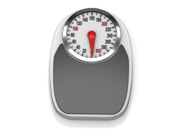 A friend gifted me an old Garmin watch recently and it has been fun to see how it tracks my stress level throughout the day. So, what is the big deal about stress anyway? Why do our watches think it is important enough to track? It is no secret that our stress levels impact our health. Stress in and of itself is not necessarily a bad thing. God gave our bodies an automatic response to prepare us to handle tough situations well. The problem in our modern society tends to be that the stressors we experience don’t have a defined end point so our stress response doesn't shut off. According to the Cleveland Clinic, long-term stress can result in high blood pressure, a weak immune system, and depression … to name just a few! So what can we do about stress? In some cases, we can actually address the thing causing the stress. Your job is stressful? Change jobs. But, as you can see with that example, these tend to be big changes that can cause more stress in the short term. So in most cases, the only real option available to you is to address your response to the stress. There are many different techniques and I encourage people that I work with to identify a few that they can try. What works for one person, or even one situation, may not work for another person or a different situation. Here are some of my favorites I have heard from people over the years:
None of these activities will actually change the situation that is causing the stress, but they halt the physical stress response in the body so that those long-term health consequences can be avoided. And, they equip you to continue your day as a contributor, despite the challenges life throws your way. What strategies have worked for you? What idea of your own or from the list above will you try?
0 Comments
 The longer I work in the Health and Fitness industry, the more and more convinced I become about just how important sleep is for our health and well-being. Truthfully, the concept of good sleep being important for health is not new. It doesn’t take a preponderance of research to know that if you aren’t sleeping enough, you don’t feel so great. But in the past few years, as the wearable fitness tracking devices have become popular, we have gained even more solid evidence to prove and explain the connection between sleep and health. Currently in the research, we can definitively say that getting a good amount of quality sleep is correlated with many different health outcomes. According to Harvard Medicine, risks of developing diabetes, obesity, heart disease, high blood pressure and even the common cold go up exponentially when an individual does not get enough sleep. We still don’t fully understand the mechanisms involved, but the correlations are clear. Getting enough quality sleep is multi-factorial. If you are in a stage of life where you are sacrificing your sleep to keep an infant alive, you deserve a round of applause, not a guilt trip! But there are a few tips that can help most of us to improve our sleep. Many of these suggestions are also found on the CDC website:
This is not an exhaustive list, but some of the more common ideas I often discuss with clients. Again, please do not feel guilty when there are circumstances outside of your control! You might be able to choose one or two things that can help, or you might just need to be amazed at what your body can accomplish even if it is sleep deprived during this season! I’d love to hear from you! What has worked for you or what would you like to incorporate in the next few weeks to encourage better sleep?  At the risk of beating the exercise drum to death, I have one more topic that I think deserves some thought: Exercise and Weight. It is true that exercise burns calories. And that does help with weight loss. But there is an even greater benefit at play here that is less gratifying because it is less immediate. But it is powerful long term. And really, the way I should title this post is “Exercise and Body Composition.” While the scale is a useful tool, the real health gains are in fat loss, not just weight loss. Weight loss without exercise results in both fat and muscle tissue loss. Loss of muscle tissue results in lower metabolism. Weight loss with exercise, on the other hand, results in almost all of the lost weight being from a reduction in the fat tissue. And by at least maintaining if not building muscle tissue, metabolism is maintained or improved. So, while exercise in most cases does play a supporting role to diet when a person is seeking to achieve a healthy weight, it is still important. According to the CDC, one the weight is lost, maintaining a healthy weight is VERY related to how fit a person is. It just takes more calories to keep muscle tissue alive even at rest. So a more fit individual is burning more calories just sitting on the couch not even using those muscles! In the short term, it isn’t much. But over months and years, that extra calorie burn can really add up! I encourage clients to not be discouraged when they don’t see the immediate effects of exercise in their weight loss. As long as their dietary choices are on par, it is actually a good sign. They are creating a more fit and lean body and the weight will come off as their new metabolism kicks in! |
AuthorKatie Kolb - Health Coach Archives
June 2024
Categories |
 RSS Feed
RSS Feed